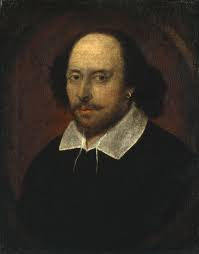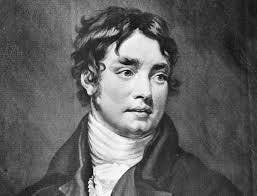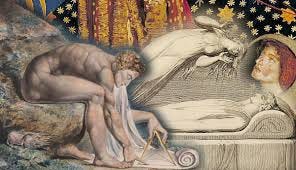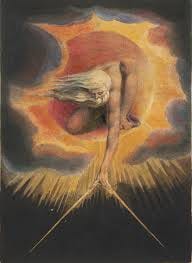‘The poet's eye, in a fine frenzy rolling, doth glance from heaven to Earth, from Earth to heaven; and as imagination bodies forth the forms of things unknown, the poet's pen turns them to shape and gives to airy nothing a local habitation and a name; such tricks hath strong imagination.’
Shakespeare
This week, let's explore something that I believe is important.
I feel anxious in attempting this as it’s a subtle and delicate thing, as delicate as the gossamer wings of a butterfly or fairy gold that can turn to dust in the morning.
Let’s start with that mysterious quotation from Shakespeare, which seems to be telling us about the alchemical marriage of ‘imagination’ and ‘creation’.
‘Fine Frenzy rolling’ seems to hint at a changed state of being that the poet has entered; it is a ‘Fine Frenzy’ which implies a positive, and this means he or she can glance from ‘heaven to earth’ and then from ‘earth to heaven’. The alliteration takes us into the verb ‘rolling’, which all points to a dynamic process.
Shakespeare worked in a Christian Tradition, and scholars like John Vivyan have traced Platonic thought in his work, although the words carry his meaning intact. I would suggest that Heaven symbolises the Eternal and Eternity, and Earth the temporal, where all is flux and change. The use of the verb ‘glance’ is telling, as if this is a dynamic but momentary thing. We are with the Poet in this atomic moment of creation.
The ‘Poet’ is an inspired calling, a divine calling. Then we have the word ‘eye’, so here we are saying something special about the perception of the poet. I am reminded of William Blake’s insight that we, ‘see through the eye and not with it.’ Blake is an example of someone who was always in this state of double vision, aware of the eternal within time.
The real poets I have been fortunate to know are more like mediums; they seem to channel their work, and it comes through them and not from them. They may have a well-furnished mind, be well read and work hard at their art, but the true poet is inspired and can enter this inspired state. Consciousness infused with emotion and energy is a variable oscillation. I suppose it is what is sometimes called a state of flow. There seems to be within this process a sense of surrender of the individual will to something greater than themselves.
Imagination, Shakespeare tells us, then bodies forth ‘the form of things unknown.’ There seems to be a freedom in this, as if something is given, rather like the seamless action of grace.
There is a mystery in this, and perhaps a necessary one. Anyone who creates anything is perhaps aware of this; the blank piece of paper before the first brush stroke or word is written, the pregnant pause between thought and becoming.
Within this imaginative process that Shakespeare so beautifully captures within four lyrical lines, is a certain quality that none of us can see and none of us can define, but which has the total capacity to bring about a true freedom.
I would say that we must continually look within at what is awakened in us, especially when it meets what comes from without. When we try to capture this or explain this, we are always in danger of explaining it away, but when we experience it, there is a release and a direct apprehension. It is perhaps the true poets who get nearest to capturing this moment, art approximating the artless, the natural, unbounded ‘isness’ of what is.
Blake says we all need to practise an art to be truly human. There seems to be something within us that pushes forth to complete a sense of the world, that creates a sense of reality, that in Shakespeare’s words ‘bodies forth’, creating something in Time. This dance between the Eternal and Time is something we all experience, and the imagination as a faculty of the mind dances between both in the curious illusion of consciousness.
Coleridge, in his way, famously distinguished between two types of imagination: the primary and the secondary.
He describes the primary imagination as the "living power and prime agent of all human perception." It is the inherent ability of the mind to perceive and make sense of the world. This form of imagination is fundamental and universal, functioning unconsciously and automatically. It allows individuals to synthesise sensory experiences into coherent perceptions, thus forming the basis of all knowledge and understanding.
In contrast, the secondary imagination is a conscious and deliberate act of creativity. Coleridge referred to it as an "echo" of the primary imagination, yet it holds the power to transcend mere perception. The secondary imagination involves the process of artistic creation and the ability to reshape and recombine elements of experience into new forms. It is responsible for the creation of art, literature, and other expressions of human creativity, enabling the artist to transform reality into innovative and meaningful works.
In summary, Coleridge's definition of imagination encompasses both the unconscious perception of reality and the conscious creation of new and imaginative expressions.
This is useful in some ways, but perhaps not what Shakespeare captures and certainly not what Blake means by imagination.
I asked Satish Kumar once what the imagination was, and he replied that it was the ‘unmanifest’. There is a whole philosophy and cosmology behind this answer. It does seem, though, that a human being has this unique ability in the whole of creation to consciously manifest ideas into forms, and these are multitudinous. This movement from unmanifest to manifest is within the pattern of our very breathing, an inbreath and then an outbreath, which creates energy and a regular pattern. We imagine and walk in imaginations wake.
With this imaginative movement from unmanifest to manifest, there is an inherent principle of beauty. A harmonious reality is not just beautiful, but is made beautiful through manifestation, and it evokes a creative action, an action that flows from beauty and blesses itself. This is what happens when a poem seems to manifest whole and complete, or a piece of music, or indeed any piece of art.
In a rich metaphysical understanding of reality, the senses of order, action and beauty are interconnected. With this, we can understand that the world and love of the beautiful draw all things to God. Expressed another way, this is the active and creative nature of the Good.
More next week, and thanks for reading.
David








David, I'm glad for your approach to this subject. 'Of this a lot more could be said'. I'll not try to pin it down., but a memory stirred, and I read this: "extramission" or "emission" theory, proposed that vision was not solely about receiving information from the outside world, but also about the eyes actively emitting or projecting something to perceive the world". which takes us back to the Greek mind and our heritage.
PS Mark Vernon is giving us snippets and I think his book on Blake will be a must
PPS Satish is still giving talks I learn. Homecoming at The Lost Garden’s of Heligan in Cornwall Satish Kumar, Sunday 15th June. There are lots of others during the festial.